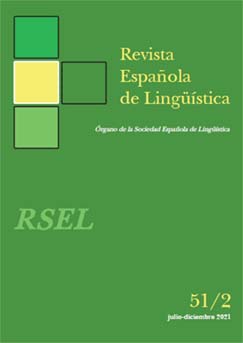On Mentalist Approaches to Language. Comparing Perspectives and Finding Meeting Points
https://doi.org/10.31810/rsel.51.2.2
Keywords:
Generative linguistics; cognitive linguistics; computation; Universal Grammar; general cognition.Abstract
In this paper we deal with two mentalist approaches to the study of language: the generative and the cognitive approaches. First, we put forward the assumptions of generative linguistics, which is focused on the formal study of computational properties of language; and, second, we compare them with those of the alternative program of cognitive linguistics, according to which language is not to be analyzed as a specific computational property of the human mind but rather as a capacity based on general cognition principles. After having presented the different theoretical foundations of both approaches, some meeting points between them are offered. The present work concludes with an appeal to the need to establish some bridges between different approaches that allow them to face the challenges currently posed by different advances in language sciences and cognitive science in general.
Downloads
References
Acedo Matellán, V. (2016): The morphosyntax of transitions. A case study in Latin and other languages. Oxford: Oxford University Press.
Baker, M. (2009): «Language Universals: Abstract not Mythological», Behavior and Brain Sciences 32.5, pp. 448-449.
Baker, M. (2011): «The interplay between Universal Grammar, universals, and lineage specificity: Some reflections raised by Dunn, Greenhill, Levinson, and Gray 2011», Linguistic Typology 15, pp. 473-482.
Barcelona, A. y J. Valenzuela. (2011): «An overview of cognitive linguistics», en M. Brdar, S.Th. Gries y M. Žic Fuchs (eds.): Cognitive Linguistics: Convergence and expansion. Ámsterdam y Filadelfia: John Benjamins, pp. 17-44.
Bruening, B. (2010): Reseña de Ramchand (2008): Journal of Linguistics 46, pp. 260-270. doi:10.1017/S0022226709990363
Cano Cambronero, M. Á. (2014): «¿Cómo interactúan la información del léxico y la configuración sintáctica? Divergencias entre el neoconstruccionismo y el lexicalismo», RSEL 44(2), pp. 7-37.
Chomsky, N. (1957): Syntactic structures. The Hague: Mouton.
Chomsky, N. (1981): Lectures on government and binding. Dordrecht: Foris.
Chomsky, N. (1995): The minimalist program. Cambridge, MA: MIT Press.
Chomsky, N. (2005): «Three factors in language design», Linguistic Inquiry 36, pp. 1-22.
Chomsky, N. (2016): What kind of creatures are we? New York: Columbia University Press [Trad. esp.: ¿Qué clase de criaturas somos?, Barcelona: Ariel, 2017].
Chomsky, N., Á. J. Gallego y D. Ott. (2019): «Generative grammar and the Faculty of Language: Insights, questions, and challenges», Catalan Journal of Linguistics. Special Issue 2019, pp. 229-261.
Croft, W. (2001): Radical Construction Grammar. Syntactic theory in typological perspective. Oxford y Nueva York: Oxford University Press.
Cuenca, M- J. y J. Hilferty. (1999): Introducción a la lingüística cognitiva. Barcelona: Ariel.
Dąbrowska, E. (2015): «What exactly is Universal Grammar, and has anyone seen it? Frontiers in Psychology 6, 852. doi:10.3389/fpsyg.2015.00852
Dabrowska, E. y D. Divjak. (2015): Handbook of Cognitive Linguistics. Berlín: De Gruyter.
Den Dikken, M. (ed.). (2013): The Cambridge handbook of generative syntax. Cambridge: Cambridge University Press.
Eguren, L. (2014): «La Gramática Universal en el Programa Minimista», RLA, Revista de Lingüística Teórica y Aplicada 52, 1, pp. 35-58.
Evans, N. y S. Levinson. (2009): «The myth of language universals: Language diversity and its importance for cognitive science», Behavioral and Brain Sciences 32, pp. 429-448.
Fodor, J. (2008): LOT 2: The language of thought revisited. Oxford: Oxford University Press.
Gallego, Á. J. (ed.) (2015): Perspectivas de sintaxis formal. Barcelona: Akal.
Gibbs, R. W. (1996): «What’s cognitive about cognitive linguistics?», en Eugene H. Casad (ed.), Linguistics in the Redwoods: The expansion of a new paradigm in Linguistics. Berlín: De Gruyter, pp. 27-53.
Goldberg, A. (1995): Constructions. A construction grammar approach to argument structure. Chicago: Chicago University Press.
Goldberg, A. (1996): «Jackendoff and construction-based grammar», Cognitive Linguistics 7, pp. 3-19.
Goldberg, A. (2006): Constructions at work. The nature of generalization in language. Oxford y Nueva York: Oxford University Press.
Goldberg, A. y R. Jackendoff. (2004): «The English resultative as a family of constructions», Language 80, pp. 532-568.
Hauser, M. D., Chomsky, N. y Fitch, W. Tecumseh. (2002): «The Faculty of Language: What is it, who has it, and how it evolved?», Science 298, pp. 1569-1579.
Hinzen, W. (2006): Mind Design and Minimal Syntax. Oxford: Oxford University Press.
Hinzen, W. y M. Sheehan. (2014): The Philosophy of Universal Grammar. Oxford: Oxford University Press.
Ibarretxe-Antuñano, I. y J. Valenzuela (eds.) (2012): Lingüística cognitiva. Madrid: Anthropos.
Jackendoff, R. (1996): «Conceptual semantics and cognitive linguistics» Cognitive Linguistics 7, 1, pp. 93-129.
Jackendoff, R. (1997): The architecture of the language faculty. Cambridge, MA: MIT Press.
Jackendoff, R. (2002): Foundations of language, Oxford: Oxford University Press.
Jackendoff, R. (2011): «What is the human language faculty? Two views», Language 87, 3, pp. 586-624.
Janda, L. (2015): Cognitive linguistics in the year 2015. Cognitive Semantics 1: 131-154.
Lakoff, G. (1987): Women, fire, and dangerous things. What categories reveal about the mind. Chicago: Chicago University Press.
Lakoff, G.y M. Johnson. (1980): Metaphors we live by. Chicago: Chicago University Press. [Trad. esp.: Metáforas de la vida cotidiana. Madrid: Cátedra, 1986].
Lakoff, G. y M. Johnson. (1999): Philosophy in the flesh. Chicago: Chicago University Press.
Langacker, R. W. (1987): Foundations of Cognitive Grammar. Vol. I: Theoretical prerequisites. Stanford, CA: Stanford University Press.
Langacker, R. W. (1991): Foundations of Cognitive Grammar. Vol. II: Descriptive application. Stanford, CA: Stanford University Press.
Langacker, R. W. (1999): Grammar and conceptualization. Berlín: Mouton de Gruyter.
Langacker, R. W. (2008): Cognitive grammar: A basic introduction. Nueva York: Oxford University Press.
Mateu, J. (2000): «La semàntica relacional de l’estructura argumental i la seva aplicació a una alternança lexicosemàntica del català», Llengua & Literatura 11, pp. 281-309.
Mateu, J. (2009): Modelos cognitivos, en E. de Miguel (ed.). Panorama de la lexicología. Ariel Letras: Barcelona, pp. 281-300.
Mateu, J. y M. T. Espinal. (2007): «Argument structure and compositionality in idiomatic constructions» The Linguistic Review 24, 1, pp. 33-59.
Mateu, J. y G. Rigau (2002): «A Minimalist Account of Conflation Processes: Parametric Variation at the Lexicon-Syntax Interface», en A. Alexiadou (ed.). Theoretical approaches to universals. Ámsterdam y Filadelfia: John Benjamins, pp. 211-236.
Mendikoetxea, A. (2009): «Modelos formales», en E. de Miguel (ed.). Panorama de la lexicología. Ariel Letras: Barcelona, pp. 301-336.
Moreno Cabrera, J. C. (2003): Semántica y gramática. Sucesos, papeles semánticos y relaciones sintácticas. Madrid: Editorial Antonio Machado.
Newmeyer, F. (2003): «Grammar is grammar and usage is usage», Language 79, pp. 682-707.
Pinker, S. y R. Jackendoff. (2005): «The Faculty of Language: What is special about it?», Cognition 95, pp. 201-236.
Ramchand, G. C. (2008): Verb meaning and the lexicon. A first phase syntax. Cambridge: Cambridge University Press.
Rohrer, T. (2005): «Embodiment and experientalism», en D. Geeraerts y H. Cuyckens (eds.). The Oxford handbook of cognitive linguistics. Nueva York: Oxford University Press, pp. 25-47.
Talmy, L. (2000): Toward a cognitive semantics. Cambridge, MA: MIT Press.
Tattersall, I. (2012): Masters of the planet. The search for our human origins. New York: Palgrave Macmillan [Trad. esp.: Los señores de la tierra: La búsqueda de nuestros orígenes humanos. Barcelona: Ediciones de Pasado & Presente, 2012].
Torrego, E. (1989): «Unergative-unaccusative alternations in Spanish», MIT Working Papers in Linguistics 10, pp. 253-272.
Published
How to Cite
Issue
Section
Copyright (c) 2021 Revista Española de Lingüística

This work is licensed under a Creative Commons Attribution-NonCommercial-NoDerivatives 4.0 International License.






